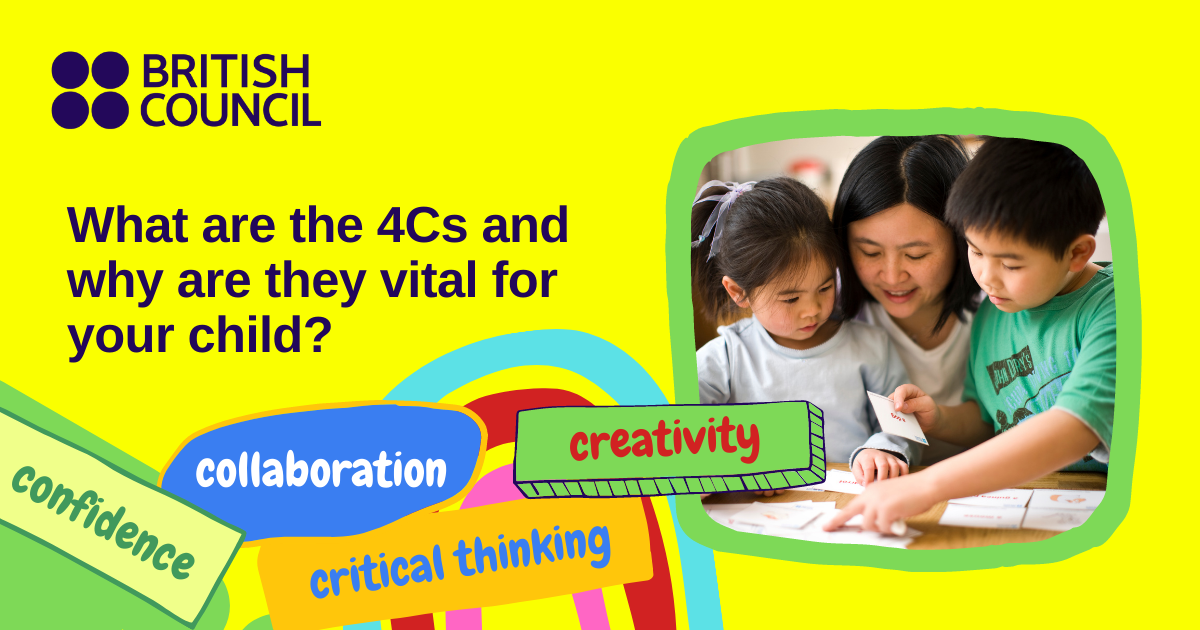Guest post by Geoff Taylor, the Head of Young Learners at the British Council in Malaysia
Previous generations learned that the ‘three Rs’ were vital in school and life. For today’s young people however, the three Rs of Reading, wRiting and aRithmetic are taken for granted. The new skills we are told that children today need are the four Cs:
- Critical thinking: finding solutions to problems and analysing information
- Collaboration: working with other people
- Communication: talking, emailing, messaging, public speaking and so on
- Creativity: thinking in new ways, looking ‘out of the box’
So why are the 4Cs so crucial? Well, in short, employers, educators and young people themselves believe these skills are necessary. This alone is a good enough reason to ensure children have them.
More than this however, if we look more closely at school performance, research has shown that American children who received instruction on these skills did better in more traditional areas. On average, they performed 11% higher in exams, showed an improved attitude to learning, spent more time on schoolwork, had better behaviour and showed greater motivation in the classroom. They were also more resilient emotionally, being less prone to depression, stress and social anxiety. Rather than being a ‘new’ set of skills that students had to learn alongside the traditional academic studies, studying the four Cs actually increased their ability in traditional school subjects and had a good impact beyond the classroom.
The good news is that many schools in Malaysia and around the world are increasingly aware of the importance of the 4Cs. There is also a lot parents can do to help.
Collaboration:
If your child does any team sports, they are learning the benefits of working collaboratively. Likewise, if they do projects with their friends, they will be developing this skill. If your child is not interested in sports or clubs, you can do something at home, as a family. This can be simple tasks such as getting your spouse and children to all tidy up or do the dishes together. Sometimes things like this can be made into a fun game. The important thing is that they begin to see the benefits of working with others to achieve a common goal. It can be faster, more efficient, more enjoyable and they can learn other ways of doing things from seeing others in action.
Communication:
Playing games with your child is a great way to teach them how to communicate. This is the classic ‘tea party’ type activity for younger children, and more complex role-playing games involving superheroes or popular film characters for older kids. Putting yourselves in different imaginary situations is a great way to teach your child the correct way to communicate in different settings. Sometimes it is useful to directly teach your children how to behave, such as explaining the best way to greet a receptionist, or a bank employee, or a street sweeper. Encourage your child to say hello too in these different settings. Also, and this is very important, be aware of how you interact with others when your child is present. Parents are the most influential teacher and what you do will impact on your child’s behaviour far more than what you say.
Creativity
There is more to being creative than liking art. It is about seeing possibilities that others miss. It is finding solutions to problems that seemed intractable. It is also a fun ability to develop. Dancing, storytelling, drawing and playing dress up all nurture creativity. However, if they don’t like doing a particular activity, don’t force them to continue with it, this should not be stressful! You can get
creative yourself with some funny questions for them to try and answer (Why don’t humans have tails? Why are clouds white?), some of their answers may really impress you! Absolutely key to this process is remembering that it is not about being ‘correct’. Creativity is about exploration and imagination, not about attempting perfection.
Critical thinking is another skill that parents can really impact. A simple way to teach your kids to think critically is by encouraging them to think of as many solutions to an issue as they can, and then going through the advantages and disadvantages of each solution. This could be to resolve problems such as how they could get money for a new toy, or how best their dolls could redecorate their house. Ask your child to think about their ideas and opinions. Ask them “Why do you think that?” to get them to reflect on how they reach conclusions. You can also share your own thought process with them.
The 4Cs are becoming increasingly important. They are valuable in their own right, but they also impact on other vital areas, such as success in school and in the world of work.
Find out about how the British Council develops the 4Cs!
About the British Council in Malaysia
Our teaching centres in Kuala Lumpur, Damansara and Penang offer English courses for kids and teens. Your children will learn more than just language, they will develop skills such as critical thinking, problem solving, making connections and leadership. Find out more.
.jpg)



